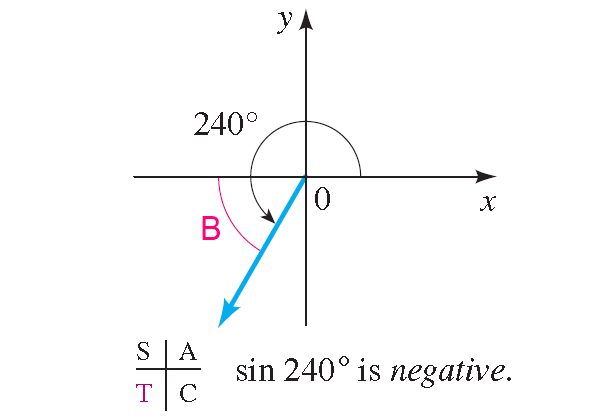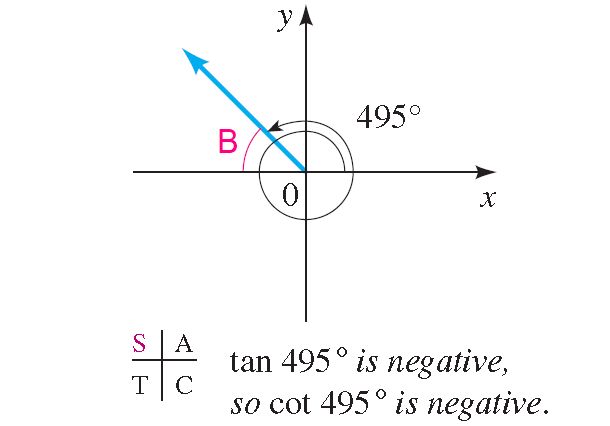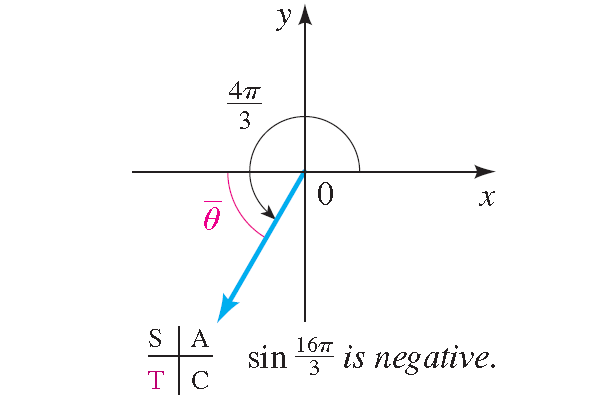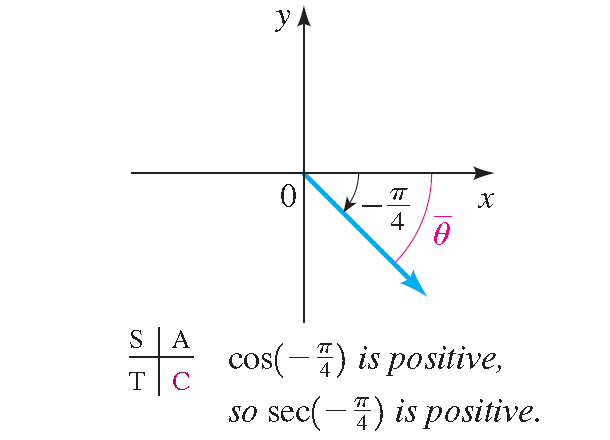EVALUATING TRIGONOMETRIC FUNCTIONS FOR ANY ANGLE
Subscribe to our ▶️ YouTube channel 🔴 for the latest videos, updates, and tips.
To find the values of the trigonometric functions for any angle u, we carry out the following steps.
Step 1 :
Find the reference angle B associated with the angle A.
Step 2 :
Determine the sign of the trigonometric function of A by noting the quadrant in which A lies.
Step 3 :
The value of the trigonometric function of A is the same, except possibly for sign, as the value of the trigonometric function of B.
Example 1 :
Using the reference angle to evaluate sin 240°.
Solution :
The angle 240° has its terminal side in quadrant III, as shown in figure below.

The reference angle is therefore
240° - 180° = 60°,
and the value of sin 240° is negative. Thus
sin 240° = -sin 60° = √3/2
Example 2 :
Using the reference angle to evaluate cot 495°.
Solution :
The angle 495° is coterminal with the angle 135°, and the terminal side of this angle is in quadrant II, as shown in figure below.

So the reference angle is
180° - 135° = 45°,
and the value of cot 495° is negative. We have
cot 495° = cot 135° = -cot 45° = -1
Example 3 :
Using the reference angle to evaluate sin 16π/3.
Solution :
The angle 16π/3 is coterminal with 4π/3, and these angles are in quadrant III, as shown in the figure below.

Thus, the reference angle is
4π/3 - π = π/3
Because the value of sine is negative in quadrant III, we have
sin 16π/3 = sin 4π/3 = -sin π/3 = -√3/2
Example 4 :
Using the reference angle to evaluate sec (-π/4).
Solution :
The angle -π/4 is in quadrant IV, and its reference angle is π/4, as shown in the figure below.

Because secant is positive in this quadrant, we get
sec (-π/4) = +sec (π/4) = √2/2
Example 5 :
Prove that
sin (8π/3) cos (23π/6) + cos (13π/3) sin (35π/6) = 1/2
Solution :
L.H.S :
sin (8π/3)
= (3π - 8π/3)
= (9π - 8π)/3
= π/3
Reference angle = π/3
sin (8π/3) = sin (π/3)
sin (8π/3) = √3/2
cos (23π/6)
= (4π - 23π/6)
= (24π - 23π)/6
= π/6
cos (23π/6) = cos (π/6)
= √3/2
cos (13π/3)
= cos (4π + π/3)
= cos π/3
= 1/2
sin (35π/6)
= sin (6π - π/6)
= sin (6π - π/6)
Using ASTC, the angle 35π/6 lies in fourth quadrant.
= -sin (π/6)
= -sin (π/6)
= - 1/2
sin (8π/3) cos (23π/6) + cos (13π/3) sin (35π/6)
= (√3/2)(√3/2) + (1/2)(-1/2)
= (3/4) - (1/4)
= (3 - 1) / 4
= 2/4
= 1/2
Example 6 :
tan (-225) cot (-405) - tan (-765) cot (675) = 0
Solution :
L.H.S :
tan (-225) cot (-405) - tan (-765) cot (675)
tan (-225) = - tan 225
225 lies in third quadrant,
reference angle = given angle - 180
= 225 - 180
= 45
Using ASTC, for the trigonometric ratios tan θ and cot θ, we will have positive sign. For other trigonometric ratios, we get negative sign.
-tan 225 = -tan 45
= -1
cot (-405) = - cot (405)
= -cot (360 + 45)
= -cot 45
It lies in the first quadrant,
= -1
tan (-765) = -tan (765)
= -tan (4 x 180 + 45)
= - tan 45
= -1
cot (675) = cot (4x180 - 45)
675 lies in fourth quadrant, for the trigonometric ratios cos θ and its reciprocal sec θ, we have positive sign. For other trigonometric ratios, we will get negative sign.
= -cot 45
= -1
tan (-225) cot (-405) - tan (-765) cot (675)
= -1(-1) - (-1) (-1)
= 1 - 1
= 0
Example 7 :
Prove that tan 720 - cos 270 - sin 150 cos 120 = 1/4
Solution :
L.H.S :
tan 720 - cos 270 - sin 150 cos 120
tan 720 = tan (4 x 180)
= tan 0
= 0
cos 270 = cos (180 + 90)
= cos 90
= 0
sin 150
Reference angle for 150
= 180 - 150
= 30
sin 150 = sin 30
= 1/2
cos 120
Reference angle for 120 = 180 - 120
= 60
cos 120 = -cos 60
= -1/2
tan 720 - cos 270 - sin 150 cos 120
= 0 - 0 - 1/2 (-1/2)
= 0 + 1/4
= 1/4
Hence it is proved.
Example 8 :
sin 780 sin 480 + cos 120 sin 150 = 1/2
Solution :
L.H.S :
sin 780 sin 480 + cos 120 sin 150
sin 780 = sin (4 x 180 + 60)
= sin 60
Since angle 60 degree lies in the first quadrant, reference angle is also the same.
sin 60 = √3/2
sin 480 = sin (2 x 180 + 120)
= sin 120
120 lies in second quadrant, using ASTC for sin θ and its reciprocal cosec θ, we will have positive sign.
Reference angle for 120 degree is = 180 - given angle
= 180 - 120
= 60
= sin 60
= √3/2
cos 120 = cos (180 - 120)
= -cos 60
= - 1/2
sin 150 = sin (180 - 150)
= sin 30
= 1/2
sin 780 sin 480 + cos 120 sin 150
= (√3/2) (√3/2) + (-1/2) (1/2)
= 3/4 - 1/4
= (3 - 1)/4
= 2/4
= 1/2
Subscribe to our ▶️ YouTube channel 🔴 for the latest videos, updates, and tips.
Kindly mail your feedback to v4formath@gmail.com
We always appreciate your feedback.
About Us | Contact Us | Privacy Policy
©All rights reserved. onlinemath4all.com

Recent Articles
-
Digital SAT Math Problems and Solutions (Part - 1)
Feb 05, 26 09:37 AM
Digital SAT Math Problems and Solutions (Part - 1) -
AP Precalculus Problems and Solutions
Feb 05, 26 06:41 AM
AP Precalculus Problems and Solutions -
SAT Math Preparation with Hard Questions
Feb 05, 26 05:30 AM
SAT Math Preparation with Hard Questions

